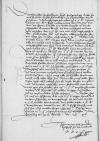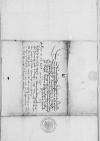Gestriges tages gen abent ist E(wer) F(urstlichen) D(urchlauch)t camer junge von ko(nigliche)m hoffe widder an uns kommen, / und uns von den herren ⌊canczler⌋ und ⌊under canczler⌋ uf unser schreÿben ⌊⌋ bracht, / die uns anzeigen und vor gut ansehen, / das E(wer) F(urstliche) D(urchlauch)t, wie wir auch negst ⌊⌋, / zubesuchen ⌊ko(niglich)e m(aieste)t⌋, unsern aller gnedigisten hern, ym wege gen ⌊Litten⌋ / nicht underlisse. / Melden aber doneben, das ⌊ir m(aieste)t⌋ bis gen der ⌊Wilne⌋ nindert im zoge uber ein nacht wirt vorharren, / wie solchs ane zweifel aus schrifften von hofe, / und was sonst do / und aus ⌊Hungarn⌋ newes ist, / E(wer) F(urstliche) D(urchlauch)t klerlicher wirt vornehmen. / Uns ist auch ein ⌊⌋ von E(wer) F(urstlichen) D(urchlauch)t worden vor den edeln, ernvhesten h(ern) ⌊Friedrichen von Olsnitz⌋, / heubeman zum ⌊Hoenstein⌋, E(wer) F(urstliche) D(urchlauch)t obermarschalk, von wegen seiner mulhen, die er uff unserm und unsers ⌊w(irdigen) capittels⌋ halben strome zu bawen vorgenommen, / worynne wir E(wer) F(urstliche) D(urchlauch)t zugefallen gedachtem E(wer) F(urstliche) D(urchlauch)t ober marschalh, / dem wir mit sondern gunsten gewogen, / so vil uns ummer muglich und fueglich, gerne wollen forderlich sein. / Es mag aber derhalben bequemer weiss nicht eher, biss im November nach aller heÿligen tage, / uff welche zeit bei unser kirchen ein general capittel gehalten wirt, gehandelt werdenn. / Was wir zur selbten zeit uf E(wer) F(urstlichen) D(urchlauch)t vorschrifft neben unserm ⌊w(irdigen) capittel⌋ zu willen mugen ausrichten, / sal an unserm vleis nichts abgehen. / Nechten spet ist auch ein loffender bott mit E(wer) F(urstlichen) D(urchlauch)t ⌊⌋ und anderm schreiben an uns gelangt, / bei dem wir weiter E(wer) F(urstliche) D(urchlauch)t wollen beantworten, / und haben diesen E(wer) F(urstlichen) D(urchlauch)t camerjungen, / dieweil er von ko(nigliche)m hoffe brieffe mit sich hat, nicht wollen lenger ufhalten. / Thuen uns hiemit in E(wer) F(urstlichen) D(urchlauch)t gunst vortrawlich befelhen.
 GStA PK, HBA, C1 No 665, 2 unnumbered
GStA PK, HBA, C1 No 665, 2 unnumbered  GStA PK, HBA, C1 No 665, 1 unnumbered
GStA PK, HBA, C1 No 665, 1 unnumbered 
